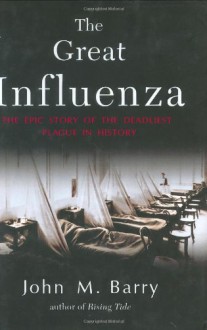The Great Influenza: The Epic Story of the Deadliest Plague in History
by:
John M. Barry (author)
No disease the world has ever known even remotely resembles the great influenza epidemic of 1918. Presumed to have begun when sick farm animals infected soldiers in Kansas, spreading and mutating into a lethal strain as troops carried it to Europe, it exploded across the world with unequaled...
show more
No disease the world has ever known even remotely resembles the great influenza epidemic of 1918. Presumed to have begun when sick farm animals infected soldiers in Kansas, spreading and mutating into a lethal strain as troops carried it to Europe, it exploded across the world with unequaled ferocity and speed. It killed more people in twenty weeks than AIDS has killed in twenty years; it killed more people in a year than the plagues of the Middle Ages killed in a century. Victims bled from the ears and nose, turned blue from lack of oxygen, suffered aches that felt like bones being broken, and died. In the United States, where bodies were stacked without coffins on trucks, nearly seven times as many people died of influenza as in the First World War. In his powerful new book, award-winning historian John M. Barry unfolds a tale that is magisterial in its breadth and in the depth of its research, and spellbinding as he weaves multiple narrative strands together. In this first great collision between science and epidemic disease, even as society approached collapse, a handful of heroic researchers stepped forward, risking their lives to confront this strange disease. Titans like William Welch at the newly formed Johns Hopkins Medical School and colleagues at Rockefeller University and others from around the country revolutionized American science and public health, and their work in this crisis led to crucial discoveries that we are still using and learning from today. The Washington Post’s Jonathan Yardley said Barry’s last book can "change the way we think." The Great Influenza may also change the way we see the world.
show less
Format: hardcover
ISBN:
9780670894734 (0670894737)
ASIN: 670894737
Publish date: February 9th 2004
Publisher: Viking Adult
Pages no: 560
Edition language: English
Category:
Non Fiction,
History,
Science,
Biology,
Health,
Medical,
American History,
Medicine,
World History,
Illness,
Disease

THE definitive book on the subject of the 1918 influenza pandemic. More recent and way more detailed (and referenced!) than Gina Kolata's book, Flu, which I also read. The particular value of Barry's book, in addition to tracing the actual courses of the global waves of infection (there were at leas...

Don't, as I did, make the mistake of reading this on a plane, or you, too, will have an influenza/Twelve Monkeys experience of others' ubiquitous pathogens.Barry is repetitive at times. I didn't mind the long tangential segments that provided background for his flu-based sections. It felt grand and ...

Read it for a biotech class in college and really enjoyed it- I mean, it shined pretty brightly compared to my biochem textbook

Very interesting. Other reviewers thought the book should have been written as 2 books - one on the scientists, one on the epidemic - but I thought it was fine. This is mainly a book about American scientists (you get the feeling that they were the only country working on the influenza epidemic but ...

Two things kept me from enjoying this book. The first was that it could have used some editing. It was so long that Audible split its audiobook file into three parts, and a huge portion of the first section was concerning, not the 1918-1919 pandemic, but the history of medical education in America. ...






 12 years ago
12 years ago




 12 years ago
12 years ago




 13 years ago
13 years ago




 13 years ago
13 years ago




 15 years ago
15 years ago